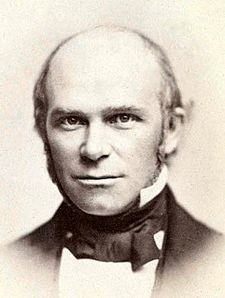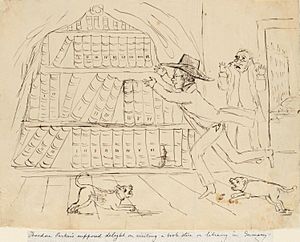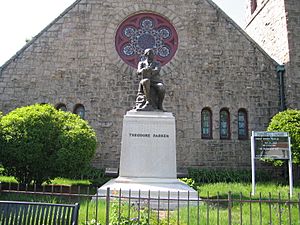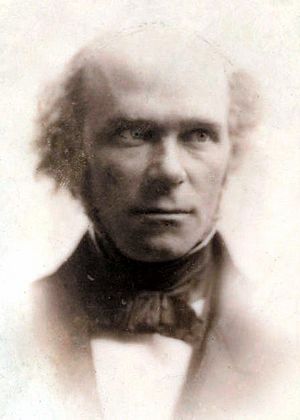Theodore Parker facts for kids
Quick facts for kids Theodore Parker |
|
 Parker c. 1855 |
|
| Born | August 24, 1810 in Lexington, Massachusetts, U.S. |
|---|---|
| Died | May 10, 1860 (aged 49) in Florence, Italy |
| Spouse | Lydia Dodge Cabot |
Theodore Parker (born August 24, 1810 – died May 10, 1860) was an American Unitarian minister. He was a leading thinker in transcendentalism, a movement that focused on individual experience and intuition. Parker was also a strong supporter of social change and a famous abolitionist. His powerful words and ideas later inspired important speeches by leaders like Abraham Lincoln and Martin Luther King Jr..
Contents
Theodore Parker's Early Life and Education
Parker was born in Lexington, Massachusetts, into a large farming family. He was the youngest of eleven children. His grandfather, John Parker, was a hero from the Battle of Lexington during the American Revolution.
Theodore faced many family losses when he was young, likely due to a disease called tuberculosis. His mother, whom he was very close to, died when he was only eleven. Despite these sad times, he focused on learning and believed strongly in "the immortality of the soul." This idea became a key part of his religious beliefs later on.
As a teenager, Parker was known for being smart, emotional, and witty. He was excellent at school and taught himself many subjects like math and Latin. At seventeen, he started teaching in local schools. He continued to study on his own, even learning Hebrew.
College and Religious Training
In 1830, at age 19, Parker walked ten miles to apply to Harvard College. He was accepted but couldn't afford to live there. So, he studied at home, worked on his family's farm, and only went to Harvard for exams. This way, he finished three years of study in just one.
He then worked as a teacher in Watertown, Massachusetts. There, he met Lydia Dodge Cabot, who would become his wife. They married on April 20, 1837. While teaching, Parker wrote his first major work, The History of the Jews. In it, he showed his doubts about biblical miracles, which was a very modern way of thinking for his time.

Parker thought about becoming a lawyer, but his deep faith led him to study theology instead. He joined the Harvard Divinity School in 1834. He loved studying German religious ideas and was inspired by thinkers like Coleridge, Carlyle, and Emerson. Parker was very good at languages, knowing Latin, Greek, Hebrew, and German. He finished divinity school quickly in 1836 so he could marry and start his work as a minister.
Early Career and New Ideas
The late 1830s were a challenging time for Parker. He hoped for a family and a good career, but things didn't go as planned. His new ideas caused some disagreements in the religious community.
Marriage and First Church
Parker and Lydia Cabot married in 1837. Their marriage had some difficulties, and they were sad they couldn't have children.
In 1837, Parker became the minister at a church in West Roxbury, near Boston. At first, he found the work a bit boring. But he soon became a popular and effective speaker. In 1840, Harvard gave him an honorary master's degree because of his wide knowledge.
Parker often preached about how religion was more than just being moral. He believed that people naturally want to worship a higher power and feel connected to God through prayer and love.
Exploring Transcendentalism
In 1837, Parker started attending meetings of the Transcendental Club. He was very impressed by Ralph Waldo Emerson's ideas. Parker joined other Transcendentalists like Henry David Thoreau and Emerson. They believed that the world was divine and that humans were part of this divinity.
Unlike some others, Parker felt that Transcendentalism was deeply religious and should not move away from faith. All the Transcendentalists agreed that slavery should end and that society needed many reforms.
Parker slowly brought Transcendentalist ideas into his sermons. He was careful at first, writing to a friend, "I preach abundant heresies... for the listeners do not know how heretical they are." He questioned parts of the Old Testament, like miracles and prophecies. These questions about the Bible's literal truth led to the development of liberal Christianity in the 1800s.
In 1838, Parker published his first important article, where he openly disagreed with the idea that Christianity was based on miracles. He believed Christianity was natural, not supernatural. He also started praising social reform movements, like those for temperance (avoiding alcohol) and peace, and especially the movement to end slavery.
Breaking with Traditional Views

In 1841, Parker gave a famous sermon called A Discourse on the Transient and Permanent in Christianity. In this sermon, he clearly stated his radical religious views. He believed that many old Christian traditions and ideas were not the true essence of Jesus's teachings. He argued that the core message of Jesus was permanent, but the ways it was taught and practiced could change over time.
Parker believed that people could experience God directly and personally, without needing miracles or strict rules. He saw the Bible as having contradictions and mistakes, but he kept his faith in God.
His church in West Roxbury stayed loyal to him. However, many other ministers and media outlets attacked him. They questioned if he was still a Christian because he denied biblical miracles and the Bible's literal authority. Many churches in Boston closed their doors to him, and he lost friends. Parker was sad but also determined. He felt he was a religious reformer, speaking out for what he believed was right.
Later Life and Fight for Justice
Parker's life and work became more stable in the 1840s. The second half of his career was mostly about fighting against slavery, supporting democracy, and working for social change based on his religious beliefs.
Travel and Personal Growth
In 1843 and 1844, Theodore and Lydia traveled in Europe. This trip helped Parker's religious ideas and personal life mature. He became less sensitive to criticism and handled problems more easily. Being away from family issues, his marriage also seemed to improve. His travels also made him more interested in political and social issues.
Leading a New Church in Boston
When Parker returned to the United States, there was a big debate among Unitarians about whether he should still be allowed to be a minister. In 1845, a large group of his supporters in Boston decided to give him "a chance to be heard." They rented a hall and invited him to preach there.
Parker accepted and gave his first sermon at the Melodeon (Boston, Massachusetts) Theater in February 1845. He later resigned from his West Roxbury church and named his new congregation the 28th Congregational Society of Boston. His new church grew very large, with about 2,000 members. This was about three percent of Boston's population at the time!
Famous people like Louisa May Alcott, William Lloyd Garrison, and Elizabeth Cady Stanton were part of his congregation. Stanton said his sermons were "soul-satisfying" and that he introduced her to the idea of a Heavenly Mother. Parker became known for preaching about Christian social activism, meaning using faith to fight for social justice.
Today, the Theodore Parker Unitarian Church in West Roxbury is a recognized Boston Landmark.
Fighting for Social Change
After 1846, Parker focused on the growing national conflict over slavery and the challenges facing democracy. In Boston, he led the fight against the strict Fugitive Slave Act. This law forced law enforcement and citizens in all states to help catch and return runaway enslaved people.
Parker called the law "a hateful statute of kidnappers." He helped organize open resistance to it. He and his followers formed the Boston Vigilance Committee. This group refused to help catch enslaved people and instead helped hide them. For example, they helped Ellen and William Craft escape when slave catchers came to Boston. Because of these efforts, very few enslaved people were captured in Boston and sent back South between 1850 and the start of the American Civil War in 1861.
Parker was involved in almost all the reform movements of his time. He supported peace, temperance, education, women's rights, and prison reform. His strongest passion, however, was ending slavery. He strongly spoke out against the Mexican–American War in 1847.
Parker wrote a powerful letter against slavery in 1848 called To a Southern Slaveholder. He urged people to break the Fugitive Slave Law of 1850. He worked with many formerly enslaved people, some of whom were in his church. He even hid them in his home. Although he was accused of breaking the law, he was never found guilty.
Parker was also a member of the Secret Six, a group that supported the abolitionist John Brown. After Brown was arrested, Parker wrote a public letter defending Brown's actions and arguing that enslaved people had the right to fight for their freedom.
Later Years and Death
Parker worked tirelessly throughout his life, which eventually affected his health. In 1859, he had to retire because he developed tuberculosis. At that time, there was no effective treatment for it. He traveled to Florence, Italy, seeking rest and comfort, where he died on May 10, 1860. This was less than a year before the start of the American Civil War.
He is buried in the English Cemetery in Florence. When Frederick Douglass, another famous abolitionist, visited Florence, the first place he went was to Parker's tomb.
Theodore Parker's Lasting Impact
- Unitarian Universalists today see Theodore Parker as a very important figure. He is considered a model for ministers who speak out for justice in the American Unitarian tradition.
- The church in West Roxbury where Parker first served as a minister (from 1837 to 1846) was renamed the Theodore Parker Unitarian Universalist Church in 1962. It still has that name today.
- Frances P. Cobbe collected and published Parker's writings in 14 volumes.
- Parker is famous for a phrase that inspired Abraham Lincoln. Parker often used the words, "A democracy—of all the people, by all the people, for all the people." Lincoln's law partner said he gave Lincoln a copy of a speech where Parker used this phrase. Lincoln later used a similar idea in his famous Gettysburg Address.
- Parker also predicted that the fight to end slavery would eventually succeed. He wrote: A century later, Martin Luther King Jr. often used a similar idea in his speeches. King would say, "The arc of the moral universe is long, but it bends toward justice." He used this phrase in many important speeches, including those during the Montgomery bus boycott and the Selma to Montgomery marches.
- In 1963, Betty Friedan's very important book, The Feminine Mystique, which helped start the women's movement, began with a quote from Theodore Parker from 1853.
- In 2010, when the Oval Office was redecorated for President Barack Obama, the rug included five quotes. Two of these quotes, by Lincoln and King, were inspired by Theodore Parker's writings.
See also
 In Spanish: Theodore Parker para niños
In Spanish: Theodore Parker para niños
- American Unitarian Association
- Jennie Collins, social reformer inspired by Parker
- List of opponents of slavery
 | William M. Jackson |
 | Juan E. Gilbert |
 | Neil deGrasse Tyson |


